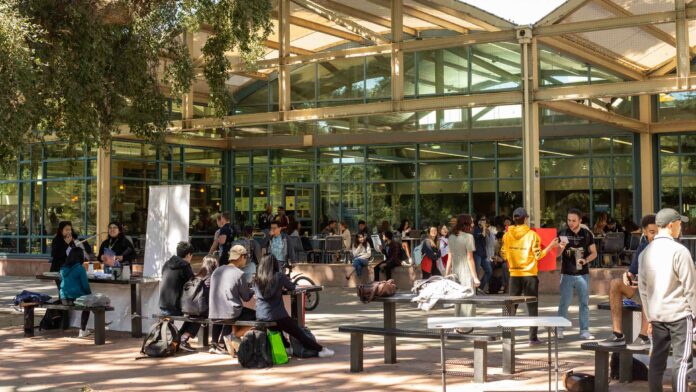UC Davis’s Principles of Community called into question when religious protesters mobilize on campus
On campus, it is not unusual to see individuals wielding signs that perpetuate hateful and oppressive messages. Campus preachers on the Quad are often difficult to ignore — these encounters can potentially compromise feelings of safety and belonging on campus for marginalized communities who may be targeted by these individuals.
Signs seen on campus contain slurs condemning “homosexuals” and urging “fornicators” to repent or “go to hell.” They also condemn the “immodestly dressed.” This content is not only threatening, but might also be considered a direct form of hate speech. And the presence of this rhetoric on campus raises the question of whether this speech should be allowed at UC Davis.
According to UC Davis’ principles of community, the university “strive[s] to maintain a climate of equity and justice demonstrated by respect for one another. We acknowledge that our society carries within it historical and deep-rooted injustices and biases. Therefore, we endeavor to foster mutual understanding and respect among the many parts of our whole.”
According to university officials, these sorts of demonstrations do not interfere with community guidelines. Interim Vice Chancellor of Student Affairs Emily Galindo explained that attempting to eliminate these protestors from the UC Davis campus would be illegal.
“The First Amendment protects nearly all speech, including speech that is annoying, rude, offensive and potentially hateful,” Galindo said. “Therefore, the university will not, and legally may not, discriminate based on content or viewpoint.”
Third-year neurobiology, physiology and behavior and Spanish double major Molly Klipfel worries that marginalized groups are disproportionately impacted by these hateful speeches.
“I feel like a campus should be a safe place, especially because we have so many marginalized groups represented at UC Davis,” Klipfel said. “Having these people on campus creates an unsafe environment for these groups, especially since the preachers largely target specific identities.”
Not only does this rhetoric affect individual students, but some Christian groups on campus feel that these perspectives misrepresent their faith.
The Belfry is a Lutheran Episcopal ministry which welcomes “all UC Davis students, faculty, and staff regardless of religious (or non-religious) background, gender or gender identity, race, sexual orientation [or] ability.” Pastor Casey Dunsworth, the Lutheran pastor at The Belfry, said that “often, being Christian is associated with those who are very hateful or extreme.”
“My students tell me that in some of their circles, no one knows they are Christians,” Dunsworth said. “Just how, in some other circles they may have been in before, no one knew that they were queer.”
Dunsworth is concerned that these messages may cause students to question their own faith and feel insecure about their identities.
“No matter what Christian community you are a part of, it hurts to hear some stranger tell you, ‘You are going to hell,’” Dunsworth said. “No matter how confident we are in the gospel, we are still humans and it still causes harm.”
The separation of church and state is another issue called into question when discussing religious voices on campus. According to Galindo, freedom of expression eliminates all issues associated with church and state.
“From a freedom of expression perspective, the university does not discriminate based on content or viewpoint, which includes religious affiliation,” Galindo said.
Regardless of these protections, university officials retain the right to denounce actions which do not align with the Principles of Community. Since the start of the last academic year, this has occurred twice — first in response to anti-Semitic flyers posted on campus, and then almost a year later when racist grafitti was discovered in the social science and humanities building.
“We are proud that UC Davis is a global campus, with a diverse community of people coming from many different backgrounds and countries, having many different identities, experiences and perspectives,” Galindo said. “With that said, there have been specific instances where the Chancellor has issued statements with strong denouncements against recent acts of racism, hate and intimidation.”
Dunsworth commented on the university’s lack of action against hateful rhetoric seen on campus under the guise of religious ideology.
“There are organizations that are following the rules as they are written, while simultaneously telling students that some aspects of their identities are bad and wrong,” Dunsworth said. “That is what is causing harm to student.”
According to Galindo, there is little that can be done on an administrative level to combat this issue. Klipfel, however, believes that UC Davis administrators need to prioritize the physical and emotional well-being of marginalized students. She said the removal of these hateful and unregulated messages will allow all students to feel more welcome and comfortable on campus.
“These students come to campus to be students, yet they have to be afraid that they might be attacked or belittled,” Klipfel said. “They have just as much of a right to be here and to feel safe as anyone else.”
Written by: Miki Wayne — features@theaggie.org





Wow! Another safe space college. Learn about our rights and Free speech! Thank God we don’t base everything on feelings. #TRUMP 2020
“I feel like a campus should be a safe place, especially because we have so many marginalized groups represented at UC Davis.”
Your heart is in the right place but I’m sorry, rights do not end where your feelings begin.